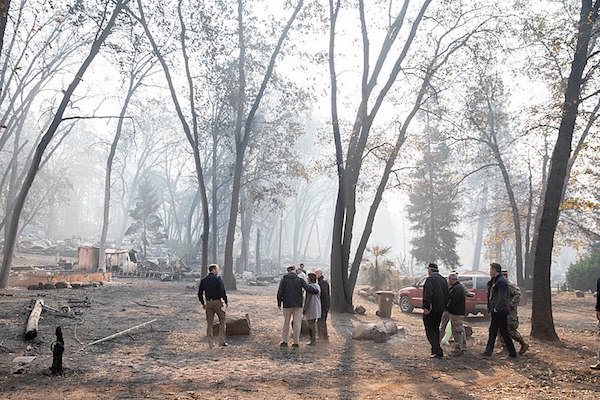Hurricane Harvey
See the following -
365 Connect Joins Forces With Habitat for Humanity in Supporting Hurricane Recovery Efforts
 365 Connect, a leading provider of award-winning marketing, leasing, and resident technology platforms for the multifamily housing industry, announced today that the company joined forces with Habitat for Humanity to support the Habitat Hammers Back initiative in response to Hurricanes Harvey and Irma. The catastrophic rampages of Hurricanes Harvey and Irma have devastated entire communities, destroying homes and leaving many people displaced and in need. Harvey dumped 19 trillion gallons of water on Southeast Texas alone, and Hurricane Irma was a 650-mile-wide storm that made landfall in Florida with unprecedented force...
365 Connect, a leading provider of award-winning marketing, leasing, and resident technology platforms for the multifamily housing industry, announced today that the company joined forces with Habitat for Humanity to support the Habitat Hammers Back initiative in response to Hurricanes Harvey and Irma. The catastrophic rampages of Hurricanes Harvey and Irma have devastated entire communities, destroying homes and leaving many people displaced and in need. Harvey dumped 19 trillion gallons of water on Southeast Texas alone, and Hurricane Irma was a 650-mile-wide storm that made landfall in Florida with unprecedented force...
- Login to post comments
After Building Apps For Harvey Victims, Houston's Techies Set Their Sights On Irma
After more than two days on a boat rescuing upwards of 50 victims of Hurricane Harvey from flooded houses, Matthew Hager decided to try to help his hometown of Houston the best way he knew how: with tech. Though Hager and his friends looked like a ragtag volunteer rescue squad, he’s a web designer by trade. With other volunteers from his design shop Poetic Systems, he built what has become one of the central hubs for information on Harvey recovery, HarveyNeeds.org. Hager and his crew are hardly alone. As Harvey hit, Houston’s startup community went into overdrive, connecting over a volunteer Slack channel and gathering around impromptu hackathons to build at least 20 new apps and sites designed to provide support to residents, first responders and the city...
- Login to post comments
Analysis of 2018's 14 Separate Billion-Dollar Disaster Events in Context
 During 2018, the U.S. experienced a very active year of weather and climate disasters. In total, the U.S. was impacted by 14 separate billion-dollar disaster events: two tropical cyclones, eight severe storms, two winter storms, drought, and wildfires. The past three years (2016-2018) have been historic, with the annual average number of billion-dollar disasters being more than double the long-term average. The number and cost of disasters are increasing over time due to a combination of increased exposure, vulnerability, and the fact the climate change is increasing the frequency of some types of extremes that lead to billion-dollar disasters.
During 2018, the U.S. experienced a very active year of weather and climate disasters. In total, the U.S. was impacted by 14 separate billion-dollar disaster events: two tropical cyclones, eight severe storms, two winter storms, drought, and wildfires. The past three years (2016-2018) have been historic, with the annual average number of billion-dollar disasters being more than double the long-term average. The number and cost of disasters are increasing over time due to a combination of increased exposure, vulnerability, and the fact the climate change is increasing the frequency of some types of extremes that lead to billion-dollar disasters.
- Login to post comments
Christians Beat FEMA, and in So Doing, Tame Big Government
Faith-based groups — Christian nonprofits, specifically — have been busy bees of late, providing more aid to hurricane victims than even FEMA, the federal agency that’s supposed to swoop to the scenes of natural disasters, assess the situation and speed the recovery and rebuilding process. Just goes to show: Where charity exists, government is not needed. Look at this, from the Daily Caller: “Faith-based relief groups are responsible for providing nearly 80 percent of the aid delivered thus far to communities with homes devastated by the recent hurricanes”...
- Login to post comments
Community Health Network in Houston Leverages Open Source Tech to Help Victims of Hurricane Harvey
 Undaunted by the devastation caused by Hurricane Harvey in Houston, the Stephen F. Austin Community Health Network (SFA) responded to the crisis by leveraging open source technology to reach out to their patients and victims of the hurricane in areas of Texas that are virtually inaccessible. The Health Network, a Federally Qualified Health Center (FQHC) covering Brazoria County, is one of the areas hardest hit by Hurricane Harvey and currently recovering. Using an advanced cloud-based version of the OpenEMR software, the SFA Community Health Network has been able to treat patients in clinics physically unreachable by their medical providers.
Undaunted by the devastation caused by Hurricane Harvey in Houston, the Stephen F. Austin Community Health Network (SFA) responded to the crisis by leveraging open source technology to reach out to their patients and victims of the hurricane in areas of Texas that are virtually inaccessible. The Health Network, a Federally Qualified Health Center (FQHC) covering Brazoria County, is one of the areas hardest hit by Hurricane Harvey and currently recovering. Using an advanced cloud-based version of the OpenEMR software, the SFA Community Health Network has been able to treat patients in clinics physically unreachable by their medical providers.
- The Future Is Open
- Login to post comments
Drones and the Future of Disaster Response
 Four continental states and one U.S. territory took a beating this fall as one natural disaster after another rocked communities in Northern California and along the Gulf Coast, spreading disaster relief resources and personnel thin as federal, state, and local governments scrabbled to address the crises. Wildfires in California's wine country claimed at least 42 lives, 8,400 structures, and 245,000 acres of land in October. Hurricanes Harvey and Irma pummeled Louisiana, Texas, and Florida only to be followed by Hurricane Maria, which slammed Puerto Rico on September 20 and left much of the U.S. territory without communications systems, electricity, clean water, or functioning hospitals....
Four continental states and one U.S. territory took a beating this fall as one natural disaster after another rocked communities in Northern California and along the Gulf Coast, spreading disaster relief resources and personnel thin as federal, state, and local governments scrabbled to address the crises. Wildfires in California's wine country claimed at least 42 lives, 8,400 structures, and 245,000 acres of land in October. Hurricanes Harvey and Irma pummeled Louisiana, Texas, and Florida only to be followed by Hurricane Maria, which slammed Puerto Rico on September 20 and left much of the U.S. territory without communications systems, electricity, clean water, or functioning hospitals....
- Login to post comments
Drones Are More Helpful than Ever in Hurricane-Ravaged Texas and Florida
Unmanned aircraft — small and large — swooped in during the aftermath of Hurricanes Irma and Harvey to get a glimpse of the devastation. That's why insurance companies have been using drone technology more than ever before to quickly -- and safely -- assess damage from the storm. It's only been fairly recently that commercial drone technology has advanced enough to take on this task on a large economic scale. And the insurance industry is just beginning to fully embrace it...
- Login to post comments
Emergency Apps You Can Use Without Wi-Fi During A Disaster
During a national disaster, contacting someone for help can be tricky. Luckily, in the digital age, there are emergency apps you can use without Wi-Fi, or cellular data, during a disaster. While some of these apps are also great hacks for free messaging during international travel, many were actually developed to help people in disaster zones call for help...
- Login to post comments
FEMA Chief Brock Long Calls Harvey a "Wake-up Call" for State, Local Officials
Federal Emergency Management Agency (FEMA) Administrator Brock Long called Hurricane and Tropical Storm Harvey a "wake-up call" for state and local officials when it comes to budgets. "It is a wake-up call for this country for local and state elected officials to give their governors and their emergency management directors, you know, the full budgets that they need to be fully staffed, to design rainy day funds, to have your own standalone individual assistance and public assistance programs," Long said on CBS News' "Face the Nation" Sunday...
- Login to post comments
FEMA Director Urges Americans to Develop “a true culture of preparedness” But No One Is Listening
It looks like preppers aren’t that crazy after all. FEMA’s new director, Brock Long, has repeatedly said that Americans do not have a “culture of preparedness,” something that is much-needed with the startling uptick in natural disasters. Long has only been the director of FEMA since June 20 of this year and already has had to deal with a historic number of disasters in this short period of time. It appears that Mr. Long has a mindset of self-reliance based on a couple of recent statements he has made to the media, but the MSM doesn’t seem too interested in his ideas about fostering a culture of preparedness, despite the practicality and essential nature of his suggestions...
- Login to post comments
Flesh-eating Bacteria, Cancer-causing Chemicals, and Mold: Harvey and Irma's Lingering Health Threats
 In the weeks following Hurricane Irma, parts of Florida have been awash in millions of gallons of sewage. Meanwhile, in Texas, oil refineries and chemical plants have dumped a year’s worth of cancer-causing pollutants into the air following Hurricane Harvey. In both states, doctors are on the lookout for an uptick in respiratory problems, skin infections, and mosquito-borne diseases brought on by the water and mold the storms left behind...
In the weeks following Hurricane Irma, parts of Florida have been awash in millions of gallons of sewage. Meanwhile, in Texas, oil refineries and chemical plants have dumped a year’s worth of cancer-causing pollutants into the air following Hurricane Harvey. In both states, doctors are on the lookout for an uptick in respiratory problems, skin infections, and mosquito-borne diseases brought on by the water and mold the storms left behind...
- Login to post comments
Florida’s Poop Nightmare Has Come True
 In the days and hours before Hurricane Irma slammed into Florida, its residents were treated to copious media speculation about nightmare scenarios. This monster storm, journalists said, could bring a 15-foot storm surge, blow roofs off of buildings, and cause tens of billions of dollars in damage. But perhaps no scenario seemed more dire than the one Quartz warned about the day before Irma made landfall: “Hurricane Irma will likely cover South Florida with a film of poop”...
In the days and hours before Hurricane Irma slammed into Florida, its residents were treated to copious media speculation about nightmare scenarios. This monster storm, journalists said, could bring a 15-foot storm surge, blow roofs off of buildings, and cause tens of billions of dollars in damage. But perhaps no scenario seemed more dire than the one Quartz warned about the day before Irma made landfall: “Hurricane Irma will likely cover South Florida with a film of poop”...
- Login to post comments
Harvey Evacuees Leave Their Belongings—and Health Records—Behind
Digitizing the world's medical records was supposed to make doctors' lives easier and patients' lives longer. But unlike banking and shopping, medicine has had a rough time transitioning to the new digital order. Because health care providers use different systems for their electronic health care records, it’s still difficult for a patient’s data to follow them through the medical ecosystem...
- Login to post comments
HHS Offers Hurricane Guidance to Healthcare Facilities
With Florida still reeling from the effects of Hurricane Irma, a federal agency within the Department of Health and Human Services has issued draft guidance to help healthcare facilities with disaster planning and recovery for major hurricanes. Based on lessons learned from Hurricanes Katrina, Sandy, Harvey and others, the document—from the Office of the Assistant Secretary for Preparedness and Response—provides an overview of the “potential significant public health and medical response and recovery needs facing hurricane- and severe storm-affected areas.” Among the topics in the draft are those covering health information management...
- Login to post comments
HIMSS19: Open Source Software for Disaster Preparedness and Response
 Although not officially listed as a track at the HIMSS19 conference, there are a series of very important presentations on the use of open source software for disaster preparedness and response. This is a critical topic that we have covered extensively in Open Health News. As we detailed in this article, there was a major failure in being able to provide victims of Hurricane Harvey, as well as Hurricane Irma and Hurricane Maria with access to their medical records. Few emergency medical responders could access their records either. The two success stories that came out of the hurricanes were two open source electronic health record (EHR) systems, OpenEMR and the VA's open source VistA EHR.
Although not officially listed as a track at the HIMSS19 conference, there are a series of very important presentations on the use of open source software for disaster preparedness and response. This is a critical topic that we have covered extensively in Open Health News. As we detailed in this article, there was a major failure in being able to provide victims of Hurricane Harvey, as well as Hurricane Irma and Hurricane Maria with access to their medical records. Few emergency medical responders could access their records either. The two success stories that came out of the hurricanes were two open source electronic health record (EHR) systems, OpenEMR and the VA's open source VistA EHR.
- The Future Is Open
- Login to post comments